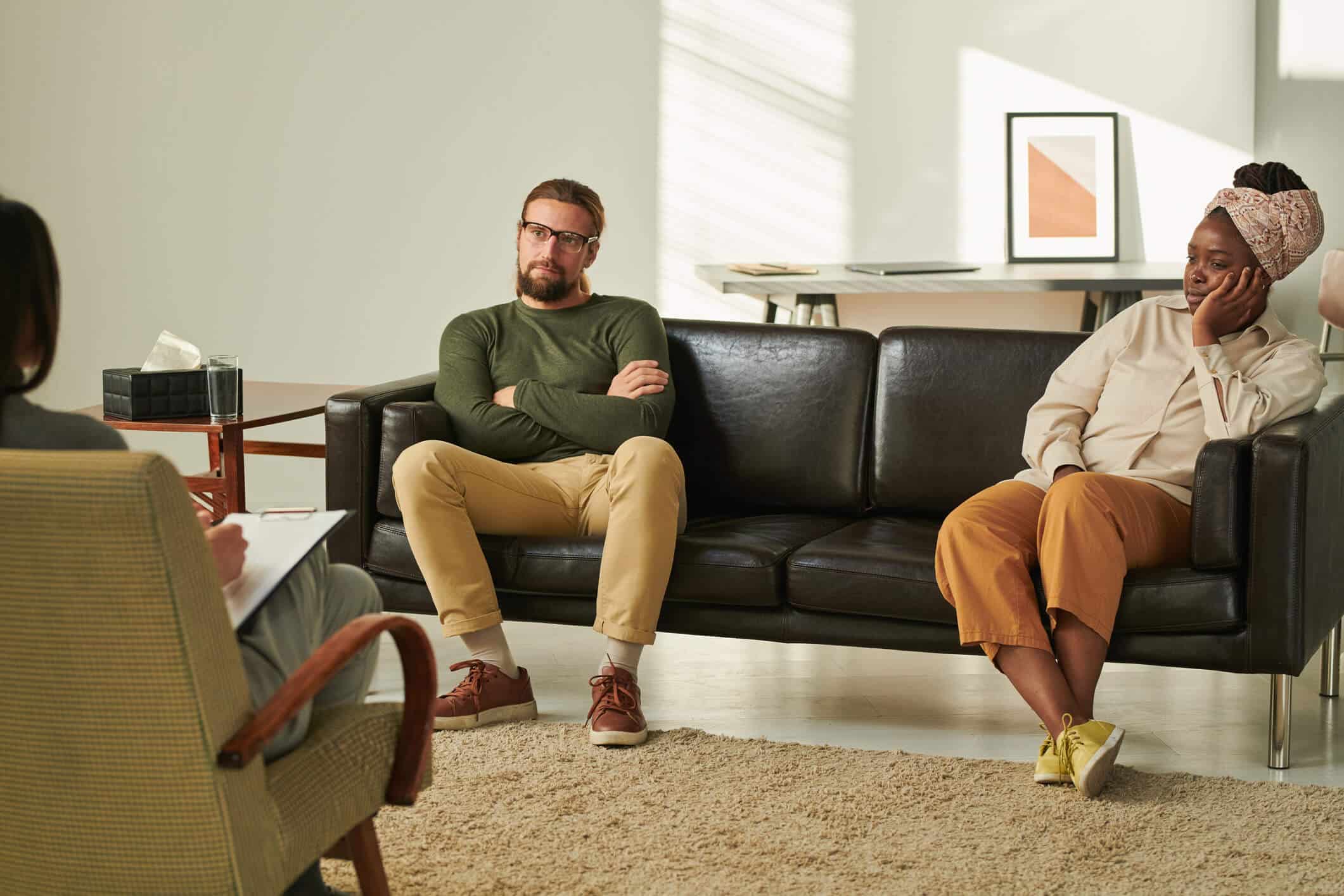If you are wondering how to become a family counselor, you might be considering marriage and family therapy as a specialization. While the term marriage and family counselor may be used interchangeably with marriage and family therapist, there are differences between mental health counselors and family therapists, which can affect the career path for each discipline.
The American Association for Marriage and Family Therapy (AAMFT) defines marriage and family therapists as “mental health professional[s] trained in psychotherapy and family systems, and licensed to diagnose and treat mental and emotional disorders within the context of marriage, couples and family systems.”
According to the U.S. Bureau of Labor Statistics, the career prospects of a family therapist are expected to grow 15% by 2032—much faster than most other occupations. Similarly, career opportunities for mental health counselors are expected to grow by 18% during the same time period. The path you choose will help determine the training and education required of you to become a Licensed Marriage and Family Therapist (LMFT), a Licensed Professional Counselor (LPC), or a Licensed Professional Clinical Counselor (LPCC). In this article, we’ll explore some of the different ways you might become a family counselor.
Mental Health Counselor Versus Marriage And Family Therapist
The Bureau of Labor Statistics may group mental health counselors with marriage and family therapists, but there are key differences between the two disciplines. While both specializations require a master’s degree and qualify professionals to diagnose and treat mental health conditions, such as mood disorders and substance use disorders, they have different focuses.
Unlike mental health counselors whose focus is on addressing the individual, family therapy looks at the whole family as a single unit. The purpose of this type of therapy is to assess how the family’s behavioral patterns and dynamics affect each individual member of the unit.
Family therapy is intended to be brief and solution-focused, spanning an average of 12 sessions. The AAMFT estimates that nearly half of the sessions are one-on-one with an individual while the other half is devoted to the couple or family.

Educational And Training Requirements Of Family And Marriage Counseling
A licensed marriage family counselor is essentially a licensed marriage and family therapist (LMFT). To be a LMFT, you will need to:
- Have a bachelor’s degree
- Obtain a graduate degree in counseling or a related field from a program accredited by the Commission on Accreditation for Marriage and Family Therapy Education*
- Complete at least 3,000 clinical hours of supervised experience under a licensed psychotherapist
- Pass licensure/certification exams that are state-specific as well as the national board exam
*According to MFT-License.com, a resource guide run by Wiley University Services for prospective practitioners of family counseling, most state licensing agencies either require or prefer programs accredited by the Commission on Accreditation for Marriage and Family Therapy Education (COAMFTE). These programs include coursework in human development, couple and family studies, and different therapeutic approaches.
A LMFT’s job and career opportunities may include working in/for:
- Private practices
- Nonprofit organizations
- Hospitals, clinics, or other clinical settings
- Rehabilitation centers
- Government agencies
- Schools
The American Association of Marriage and Family Therapy indicates three educational options that are available for prospective marriage and family therapists:
- Master’s degree, a doctoral program, or a post-graduate clinical training program
The AAMFT affirms that all American states regulate the profession by licensing their marriage and family therapists.
After graduation from an accredited program, the therapist will take a state licensing exam, and/or the national examination for marriage and family therapists through the Association of Marital and Family Therapy Regulatory Boards (AMFTRB), a licensure requirement in most states.
The Association Of Marital & Family Therapy Regulatory Boards (AMFTRB)
The AMFTRB is the official association of state licensing boards that governs the regulation of LMFTs. They exist to “coordinate among state boards developing policy guidelines for regulatory issues” and support 52 member boards, which include all states (including the District of Columbia, and Guam). They also establish the clinical competency of licensees, manage license renewals, handle disciplinary action, and more. The Marriage and Family Therapy National exam is also produced and maintained by the AMFTRB.
Requirements For Professional Counselors And Professional Clinical Counselors
Licensed professional counselors (LPCs) and licensed professional clinical counselors (LPCC) have overlapping requirements, but they differ in scope.
Both LPCs and LPCCs require a graduate degree to practice counseling; however, LPCCs are qualified to provide a clinical diagnosis for clients, unlike LPCs. With licensure, an LPCC is allowed to diagnose and treat clients with mental health disorders.
Both LPCs and LPCCs must obtain 3,000 hours of direct clinical hours, but the requirements for each license vary. LPCCs must take classes that fulfill requirements specific to diagnosing mental health disorders.
Both LPCs and LPCCs need to pass state board exams, which vary by state, to gain credentialing. They also must pass the national exam run by the National Board for Certified Counselors (NBCC).
In order to qualify as a licensed professional clinical counselor (LPCC), one must fulfill the following requirements:
- Earn a graduate degree in clinical counseling (or another related degree) that enables one to become either a licensed professional clinical counselor (LPCC) or a licensed marriage and family therapist (LMFT)
- Gain 3,000 hours of supervised clinical experience under a licensed psychotherapist
- Pass qualifying state and national board exams to obtain licensing and/or certification
LMFT Vs. LPCC
There are several differences between a licensed marriage and family counselor (LMFT) and a licensed professional clinical counselor (LPCC). Most strikingly, unlike an LMFT, an LPCC focuses on the individual and their mental health concerns, whereas an LMFT focuses on the family unit as a whole and how certain issues may affect the individual(s) within it. While an LPCC may also work with families and groups, they ultimately focus on the individual’s needs most.
Even so, both specializations are qualified to diagnose and treat mental health disorders, which may include:
- Substance use disorder
- Post-traumatic stress disorder
- Anxiety and depression

The Role Of Marriage And Family Therapists
A licensed marriage and family therapist (LMFT) focuses on helping couples (regardless of their marriage status) to address conflicts that may be affecting their mental health. Whether together or individually, an LMFT looks at the interpersonal connections within the family system, whether traditional or not. The aim is to help those within the family unit improve their communication skills and gain more insight into their dynamics.
While qualified to address mental health disorders, an LMFT may also deal with concerns such as marital challenges, infidelity or verbal abuse, child-parent dynamics, and family communication styles.
In some cases, a marriage and family therapist may also need to refer clients to another specialist.
After studying practitioners delivering marriage and family therapy in India, an abstract published by the National Institute of Health (NIH) concluded that “marital and family therapy have been found to be effective in reducing the severity of substance use, lowering marital and family conflict, improving family communication and cohesion as well as effective parenting practices.”
Seeking Therapy For Yourself
As a prospective family counselor, you likely value the role of therapy in helping others lead more fulfilling lives. While embarking on your career journey, you may also encounter challenges in your personal life. Many prospective therapists experience stress from home, work, or school and could benefit from therapy.
While your schedule may be filled with various demands and responsibilities, online therapy platforms like BetterHelp allow you to have sessions online or by phone, taking away the need to drive to an in-person appointment. You can find time slots that fit into your schedule and meet with your therapist from anywhere that feels comfortable. Having someone to lean on could make a significant difference as you chase after your personal and professional aspirations.
Although virtual therapy is a relatively new concept, research suggests that it can be just as effective as therapy offered in person. For example, a literature review of 14 studies led researchers to conclude that online interventions can improve symptoms of a range of mental health conditions, including stress.
Takeaway
The term marriage and family counselor may be used interchangeably with marriage and family therapist. However, there are differences between mental health counselors and family therapists, affecting the required training and career path for each discipline.
If you are considering marriage and family therapy as a career, you will need to complete a graduate degree and 3000 clinical hours of supervision by a psychotherapist. After graduating from an accredited program, you must then take a state licensing exam, and/or the national examination for marriage and family therapists through the Association of Marital and Family Therapy Regulatory Boards (AMFTRB), which is responsible for licensure requirements in most states.
As a prospective family counselor, you may also encounter challenges in your personal life during your education and training. Many prospective therapists experience stress and could benefit from therapy to navigate life’s challenges more effectively.



